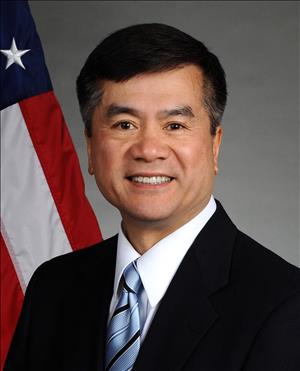On November 2, 1993, Washington voters overwhelmingly approve the state's first "three-strikes" law and narrowly approve state spending limits while rejecting a tax rollback measure. King County voters elect six new members to the Metropolitan King County Council, which is expanding from nine to 13 members as a result of the merger between Metro (the Municipality of Metropolitan Seattle) and King County. Gary Locke (b. 1950) defeats two-term incumbent County Executive Tim Hill (b. 1936), while Seattle Mayor Norm Rice (b. 1943) cruises to re-election, bucking an anti-incumbent trend that costs mayors in Spokane, Tacoma, and Everett, as well as King County Executive Hill, their jobs.
The "three-strikes" measure, Initiative 593, which mandated life in prison without possibility of parole for those convicted three times of "most serious offenses" (defined broadly to include acts such as unarmed robbery and barroom brawls resulting in injury), won three quarters of the vote. Initiative 601, which imposed a limit on state spending-increases based on the combined rate of inflation and population growth, won by a narrower margin of just over 51 percent. A companion tax-cutting measure, Initiative 602, which would have mandated immediate rollbacks of most state taxes, resulting in steep budget cuts, was soundly defeated.
Metropolitan King County Council
With no statewide offices on the ballot, attention focused on local races. King County had more than usual, because County Charter amendments approved by voters the previous year as part of the County's absorption of Metro had renamed and expanded the former nine-member King County Council into the 13-member Metropolitan King County Council. With four seats held by members elected to four-year terms in 1991, there were nine seats on the new Council up for election, including four new districts.
Only three incumbents ran -- Republicans Brian Derdowski and Kent Pullen and Democrat (and future County Executive) Ron Sims -- and all three won. Sims was unopposed in Seattle's District 5, and Pullen easily defeated an unknown Democratic challenger in the sprawling District 9 in the southeastern County. Derdowski, a maverick targeted by builders and realtors and abandoned by much of his party, saw his support-base split in the redistricting made necessary by the Council expansion. He moved from Redmond in District 3 to the new District 12 around Issaquah and defeated three other Republicans in the September primary before cruising to victory in November.
Two other incumbents (Democrat Audrey Gruger [d. 2010] in District 1 representing the northern portion of the County from Shoreline to Juanita and Republican Paul Barden in District 7 centered in Federal Way) stepped down, so there were six open seats. Republicans won four of those races, giving them a seven to six majority on the new Council. The key race was in the new District 11 on the Eastside, where Republican Jane Hague, who trailed by 136 votes on election night, surpassed Democrat Cary Bozeman in the absentee ballots and eked out a 420-vote victory.
Republicans Louise Miller from Woodinville in District 3, state Senator Peter von Reichbauer in District 7, and State Representative Chris Vance from Kent in District 13, won easily. Democrat Larry Gossett won a landslide victory in the Seattle-based District 10, while Maggie Fimia, an appointed member of the Metro Council that governed the agency until the merger, won a closer race in District 1.
King County Executive
In the County Executive race, Republican Tim Hill, who had served two terms, appeared vulnerable as voter dissatisfaction threatened incumbents around the country. In the primary, Gary Locke, who represented South Seattle in the state legislature from 1983 to 1993, defeated County Councilmembers Cynthia Sullivan and Greg Nickels (b. 1955), who would be elected Seattle mayor in 2001, and Seattle attorney Bruce Hilyer to win the Democratic nomination to oppose Hill.
Locke outspent Hill and easily warded off accusations that he favored higher taxes and spending and was soft on crime. As head of the powerful House Appropriations Committee, Locke had played a major role in drafting the state budget that inspired the tax-cutting I-601 and I-602, but King County voters rejected both those initiatives. And although Locke opposed the popular I-593 "three-strikes" initiative, he had the endorsement of unions representing police, jail officers, and prosecutors. In the end, Locke won nearly 60 percent of the vote. The grandson of Chinese immigrants, Locke was subsequently, in 1996, elected governor of Washington and re-elected in 2000.
Mayors and More
Hill was not the only local leader to fall victim to anti-incumbent feelings sweeping the state and nation. Spokane Mayor Sheri Barnard had lost her seat in the primary, and Pete Kinch of Everett and Karen Vialle of Tacoma both lost by large margins in the November vote.
One exception to the trend was Seattle Mayor Norm Rice, who defeated retired advertising executive David Stern to win his second term. Despite a bitter campaign in which Stern blamed Rice for rising crime rates, Rice won a commanding victory with two-thirds of the vote. Jan Drago won an open seat on the Seattle City Council, defeating former County Assessor and City Comptroller Norward Brooks, and three Council incumbents were re-elected by wide margins.
In the Newport Hills area, voters in a 4.4-square mile area with some 7,700 residents voted to incorporate as a city. The new city officially came into existence on September 30, 1994, and in that November's election, voters approved a name change to Newcastle.

